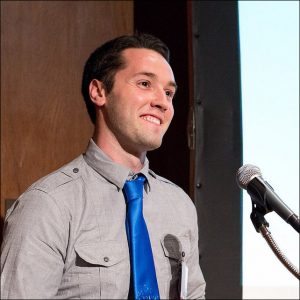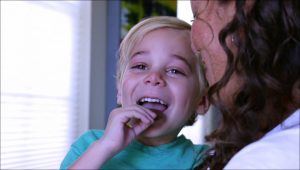Boston Rare Disease Film Festival to Feature SMA Documentary ‘Life & Atrophy’

Miles McIntosh in a scene from "Love & Atrophy" by filmmaker Gareth Burghes.
For a filmmaker whose work has covered subjects ranging from the decline of oysters off New York’s Long Island, to drought in the African nation of Malawi, to the rise of an iconic Denver bakery, spinal muscular atrophy was, perhaps, an odd choice for a documentary.
But Gareth Burghes immediately saw the impact that a film on SMA could have.
His documentary, Life & Atrophy, which runs 24 minutes, will be part of Disorder: Rare Disease Film Festival — a first-of-its-kind event in Boston, Oct. 2-3. It will air at 2:30 p.m. Oct. 2.
“The power of bringing together film, science and rare disease families leads to renewed hope for all those given a one-in-a-million diagnosis,” Burghes said in a press release. “Disorder is a film festival that finds the common ground on rare diseases, empowering all those affected.”
The festival covers more than two dozen rare diseases. The 30 films, which will be shown in seven screenings, range in length from one to 65 minutes.
Life & Atrophy is billed as “a documentary following one family’s story to defy genetic fate.” Burghes said the idea for his movie stemmed from his geneticist father’s involvement in clinical trials of SMA patients.
It tells the story of Miles McIntosh, a 5-year-old boy with SMA type 2, as his parents, Nikki and Tony McIntosh, sign him up for a trial to test the recently FDA-approved therapy Spinraza.
“While working in my father’s lab, I became entrenched in the science of SMA and started to learn that the field was on the verge of a huge breakthrough,” Burghes said in a blog posting. “I knew I had to start filming the community and follow the events as it led up to new discoveries in the field.”
Burghes said SMA “has gone from an orphan disease with nearly nothing known about it, to now having its first FDA-approved drug on the market, as well as other treatments in the pipeline. The film represents what can be accomplished when families, researchers, and pharmaceutical companies join together to solve complex diseases.”
Burghes’ previous film credits include Parched (2016), The Denver Bread Company (2015), and Filtering Futures: A Story of Long Island Livelihood & Shellfish (2013),
The Boston film festival is the brainchild of two fathers.
Daniel DeFabio’s son has Menkes disease, a rare disorder that affects only one in 100,000 newborns. Bo Bigelow’s daughter Tess has a genetic disease that’s even more rare. Only 23 people worldwide have it; there isn’t even a name to describe her illness.
Several years ago, DeFabio — also a filmmaker — did a documentary to bring awareness to his son’s disorder.
“My experience submitting to various film festivals made me realize that while a few festivals might have a focus on science or medicine, there weren’t any festivals dedicated to rare disease,” DeFabio told SMA News Today. “Bo and I began to think: what if there was a film festival that combined the general interest from the public of a typical festival with the more motivated specific interest from advocates, industry and researchers found at a conference?”
Together, the two dads established Disorder: The Rare Disease Film Festival.
“We decided to host the event in a city where neither of us lived but each had to travel to for advanced care for our children: Boston,” DeFabio said. “The concentration of medical, research, bio-tech and genetic professionals in that city meant we’d be going where our best audience already was. The response to our idea has been overwhelmingly enthusiastic.”
Between the films, rare disease researchers and patient advocates will share stories from their experience. The event has support from the National Organization for Rare Disorders, The Mighty, RDUF, MassBio, Global Genes, Rare Genomics Institute, Magic Wheelchair and several pharmaceutical companies, including Shire, Vertex and Sanofi-Genzyme.
Bigelow worked for 10 years as a New York consumer protection lawyer. His 7-year-old daughter Tess is one of only 23 people worldwide confirmed to have the USP7 genetic mutation. “She has significant cognitive delay, she doesn’t know her own name, she’s non-verbal, she has autism and vision issues, and she has gastrointestinal reflux disease,” Bigelow said.
The former attorney, who now stays home caring for Tess, said the film festival is the best way he knows of bringing attention to diseases most Americans have never heard of.
“We are not trying to make any money with this,” he said. “We’re just trying to tell our stories and promote the festival. Hopefully, tickets will cover our costs.”










